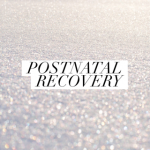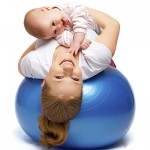A common definition for Diastasis Recti is when your rectus abdominals separate throughout pregnancy and don’t come back sufficiently.
However, it is much more than that.
Throughout your pregnancy your main external abdominal muscles (rectus abdominus) separates to make room for your growing baby. There is only so much room in your torso and to make more room these muscles separate.
This is normal.
As these muscles separate the connective tissue between these muscles becomes thin. This is called the linea alba and is a form of connective tissue which does just that. It connects these muscles to hold everything together. It can be a concern as this thinning of the linea alba doesn’t withstand as much intra-abdominal pressure as it does when not in this thinned state.
This is why doing various forms of exercises or heavy lifts during the end stages of pregnancy and during the early stages of motherhood is not recommended. It is more about controlling the amount of pressure that the abdominal wall can withstand.
What I will repeat at this stage is that abdominal separation throughout your pregnancy is normal.
Yes, we do have to be careful immediately afterwards as it takes a while for your abdominal wall to settle down. When you think about it, your whole abdominal wall has been slowly stretched for the last nine months and all of these muscles and associated connective tissue have been stretched alongside the growth of your baby.
After the birth of your baby it will take a little while for these muscles to settle back down again.
As to how long it takes for the abdominal separation to come back together? Now the answer you may not be looking for is…it depends. I know, I’m such a kill-joy.
Let’s back this up a little and let me explain.
The first question that we need to ask ourselves is:
How much of a ‘gap’ was there before you even got pregnant?
Yes, not all abs are slammed up against each other. The best example of this is to look athletics next time it is on TV.
Yes, these bodies are at the peak of physical fitness.
Now look at their abs…
What you will notice is that every person has a different shape to their abdominal wall. Some of them have a large separation, some a small separation and some no separation at all.
This is because, everyone is different.
If you know someone who has just become pregnant, get them to have their abdominal wall checked to see what degree of separation is there to start with.
Then they will have something specific to aim for once they have had their baby. It is pretty hard to get your abdominals ‘together’ if they were never together to start with.
The next point to make is, that everyone has a different pregnancy with a different sized baby. If you are quite petite and you baby is quite large relatively, then chances are the ‘gap’ will have to be larger to accommodate your baby.
Then every delivery is different, from a C-section to natural delivery to length of contractions to length of labour.
You will also need to look at exactly what you have done in the past in regards to exercise. Certain forms of exercise require more control over your deep abdominals muscles and require a higher degree of three-dimensional movement. This has a massive influence on your overall recovery rate in the postnatal period.
And…yes there is more…how much and what sort of exercise did you do throughout your pregnancy. Certain exercises will activate more of the nervous system so that it will be easier to activate this same nervous system post baby.
Then we need to look at your postnatal recovery strategies.
- How much sleep are you getting…mmm?
Sleep during this time is going to be pretty hard and revolving around your little one. This is a time prioritise sleep as the more you get the better your overall recovery will be.
- What is the quality of your sleep like?
When sleep is limited, focusing on better quality sleep is key. Developing a good sleep strategy for yourself and your partner is key. Things like decreasing all sources of light in the evenings, have magnesium baths (if possible) at night time to decrease cortisol levels and meditating before bedtime will all help with this.
- How much good quality food are you currently eating?
As the saying goes, you are what you eat. During this stage when you are just trying to survive through lack of sleep and general exhaustion, you will be tempted by eating sugar to keep yourself going. Unfortunately, this doesn’t help any situation. Aiming to fill your plate with good wholesome food is a good starting point.
- Are you drinking enough water?
A simple one but a good one. The linea alba is connective tissue which is made up of collagen and water. By taking a good quality collagen supplement you will help with the re-generation of this. But also, you should be drinking a good amount of water also as the linea alba is made up from approximately 70% water. You also need to be drinking a good amount of water to prevent your breast milk drying up if you are breastfeeding.
- How much stress are you under?
This is probably a silly question right now with a new-born in the house. Stress effects the body’s ability to recover. When you look at the overall stress loading on your body right now you will probably find that you will have lots of accumulative stress. In order to get your body in a better recovery state you can just look at reducing the small things that can cause you stress. Just by doing this you will decrease the overall load on your body
I could go on…
So when you think about it, the answer to the question…it depends!
It depends on so many different factors. It depends so many moving parts that it is hard to give an accurate answer.
However, if you work on some of the above parts that I mentioned above, you can speed up your overall recovery. But just take your time. Don’t rush. These things take time so give your body time to recover and your abdominal separation will come back together.
If you want any specific help with your postnatal recovery or what exercises will be best for you, please feel free to contact me. Always happy to help.








